

























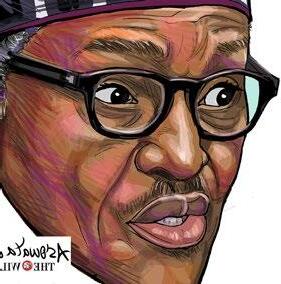

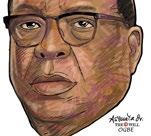
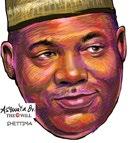
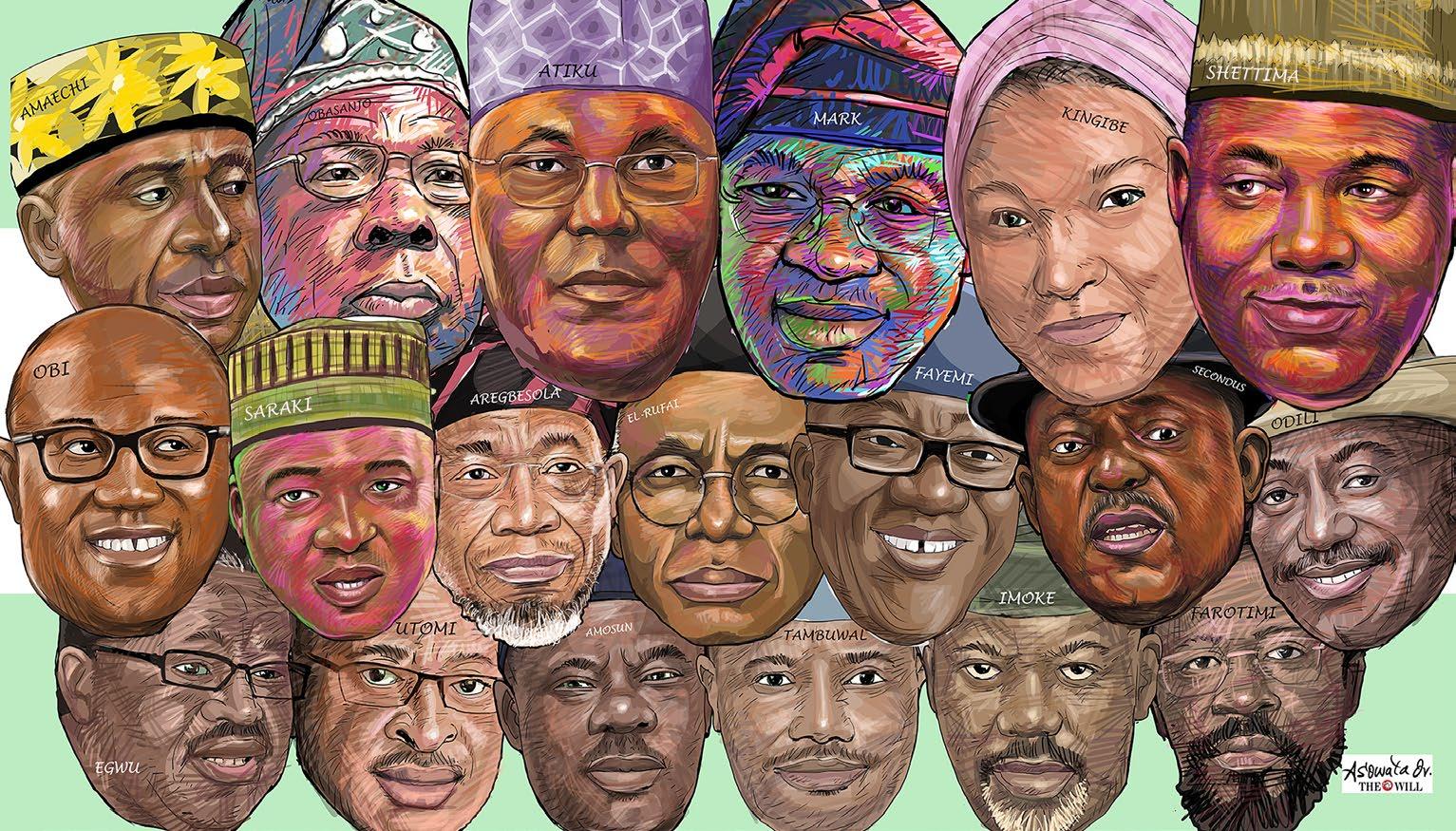


































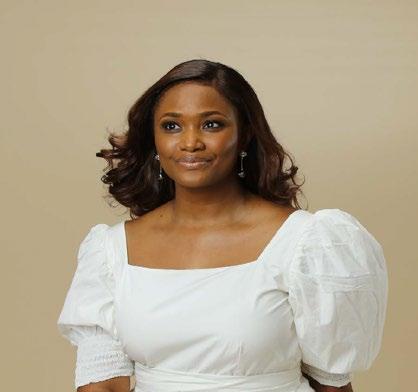
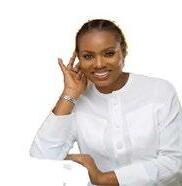


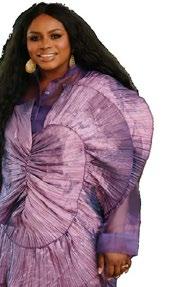

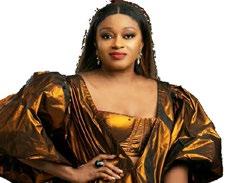

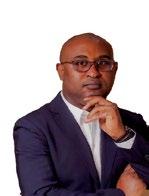








At the core of every successful Nigerian brand lies a story of bold visionaries who dared to imagine differently and build courageously. These are not just business owners; they are architects of identity, stewards of culture, and champions of self-made excellence. What they’ve created goes beyond profit margins; it’s legacy work rooted in passion, persistence, and a sense of pride. We pay tribute to the people in this story—the builders and brand-makers who are redefining what it means to be an entrepreneur in Nigeria. They are not waiting for global validation; they are leading with intention. As the world begins to notice and pay close attention to Nigeria, these people are proving that Nigeria’s greatest export isn’t products; it’s people.


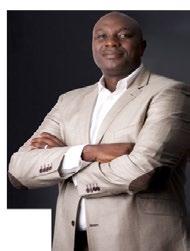
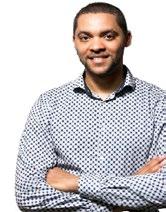



We have compiled a list of entrepreneurs who are making a name for themselves. Read all about them on pages 8 to 11.
We often hear of antioxidants for the skin and our diet, but did you know that antioxidants can work magic on your hair? Like your skin, your hair can also become damaged by exposure to sunlight and harsh chemicals, leading to dryness, hair breakage, and thinning. This is where antioxidants come in to help fight the damage and protect the hair from harmful free radicals. Read all about the types of antioxidants that work best for your hair on page 12.
Jurassic World: Rebirth is our movie reviewer’s choice for review this week. I was looking forward to watching it, but it didn’t get a good review. I might still go and see it; we’ll see.
Our playlist features a curated collection of songs that you’ll love, so go ahead and download it.
Until next week, enjoy your read.







SUNDAY, JULY 13, 2025


SUNDAY, JULY 13, 2025





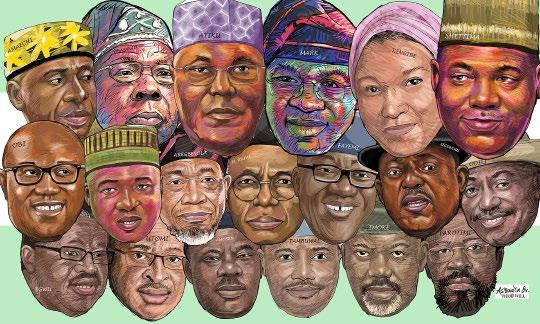
BY THEWILL EDITORS
Asthe drumbeat of opposition amongst the political class against President Bola Tinubu’s re-election in 2027 echoes louder, the scope of opposition seems to have expanded beyond expectation.
Checks show that apart from the bands of visible politicians, civil society groups and politicians working behind the scene, non-politicians, social and political organisations are also joining the bandwagon.
United by the harsh economy following government reform policies, the various groups, individuals and organisations are unfolding strategies to support their positions in divergent ways.
Luka Binniyat, spokesperson of the Middle Belt Forum, MBF, a social and political organisation representing ethnic nationalities in 14 out of the 19 states in the North, said the group has not changed its position on politics since the 2023 elections. According to him, the MBF and the Southern Leaders Forum, comprising Ohanaeze Ndigbo, Pan Niger Delta Forum, PANDEF and Afenifere led by late Pa Ayo Adebanjo and now by Oba Ladipo Olaitan, agreed that power should go to the South.
country. I must tell you, we are not comfortable with the quality of those appointed by the government to handle security matters.”
Others are the League of Northern Democrats, promoted by a former Kano State governor, Abubakar Shekarau, which at the weekend, declared its intention to join the ADC, mobilised against lawmakers that have defected to APC in violation of constitutional provisions and unite civil rights and northern groups to harmonise the region’s positions ahead of the 2027 general election.

While the politicians plan regime change through elections that will give them the advantage to implement their campaign promises, civil society groups take to activism, drawing the Federal Government’s attention to the inadequacies of its policies, projects and programmes. The politicians want to unseat President Tinubu in 2027; the other groups are demanding the reworking of the government policies perceived to be hurting most Nigerians.
Foremost among the groups is the Southern Leaders Forum comprising the Middle Belt Leaders Forum, MDBLF, Pan-Niger Delta Forum, PANDEF and Ohanaeze Ndigbo.
“All the groups are still standing on it. In 2023, we supported Peter Obi of the Labour Party. Of course, our choice for president must consider making somebody from the middle belt vice president. The middle belt controls 67 percent of the landmass in the North, including the FCT, excluding Fulani, Hausa and Kanuri ethnic nationalities. We have the numbers,” he told THEWILL on Friday.
Binniyat said the passing of Adebanjo, leader of Afenifere and Chief Edwin Clark, leader of PANDEF, created some gaps in communication within the group, which made it look like the Southern and Middle Belt leaders had gone their separate ways or changed their position on governance.
“But now that the gaps have been filled with the appointment of new leaders to replace the departed ones, we have got together to insist on good governance, restructuring of the country to make for equity and justice and headlong confrontation with insecurity in the

The Northern Elders Forum, which alleged that President Tinubu has been “pursuing a regional and sectional agenda since assuming office in May 2023, warning that such a trend threatened Nigeria’s democratic fabric and national unity,” is also up in arms against the President.
Also in the fray is the Obidient Movement, which still nurses the perception that their principal, Obi “won the 2023 election,” and have currently consolidated in about 23 states to, “get their pound of flesh,” in 2027.
THEWILL checks show that among prominent politicians working behind the scenes are two former state governors on the platform of the governing All Progressives Congress, APC. They are Senator Ibikunle Amosun of Ogun state and his Ekiti counterpart, Kayode Fayemi.
Fayemi is said to be cautious in taking sides until when the battle lines are clearly drawn, in the coming months. For Amosun, he is said to have given the opposition politicians a condition for his support: The opposition must give the presidential ticket to a southerner.
As previously reported by THEWILL in last Sunday’s cover story, ex-President Olusegun Obasanjo is working behind the scenes to broker a deal that would lead to the emergence of former Anambra Governor Peter Obi and his Kano counterpart, Rabiu Kwankwaso as candidates of the ADC in the 2027 poll.
Feelers from the field indicate that VP Kashim Shettima may challenge President Tinubu using the coalition or mobilise against his reelection if he drops him as running mate. As reported exclusively by this newspaper in its last Sunday cover story titled, ‘2027: Shettima Going..., Going…, Going…’ the President’s camp had perfected a plan to woo Dr. Rabiu Kwankwaso into the APC as the most viable replacement of VP Shettima, ahead of the 2026 presidential primaries of the party.
This move, followed by the rumble among delegates over the non -endorsement of the VP alongside President Tinubu for the 2027 poll at the Northeast APC summit in Gombe, has created a crack between the President and Vice President. VP Shettima’s remark at a book launch last week Thursday to the effect that the President has no power to remove a governor has further widened the rift between him and the President, despite the response that he was misrepresented by some media outfits.
Former President of the Senate, Bukola Saraki, is also plotting against Tinubu’s re-election. He is currently in the PDP but silently in the ADC, sources say as well as a former Governor of Rivers State, Peter Odili, who resents the manner the prolonged crisis in Rivers ended in a peace deal that strengthened the hands of one of the combatants, FCT Minister Nyesom Wike, while elders who tried to mediate were relegated to inferior roles.
Immediate past governor of Edo State, Godwin Obaseki and ex-Governor Udom Emmanuel of Akwa Ibom State are said to be taking measured steps to join the coalition.
In another development, a former governor of Kano State, Senator Ibrahim Shekarau, is said to have concluded plans to join the African Democratic Congress, ADC. To leverage his influence in the state considered as one of the most coveted by politicians because of its voting strength as well as in the North-West geopolitical zone, Shekarau formed the League of Northern Democrats, composed of grassroots politicians in the North.
NON-POLITICIANS
The Take It Back Movement whose National Coordinator, Juwon Sanyaolu, recently kicked against the prevailing hardship in the country saying, “Mass hunger, poverty and mounting insecurity are signs that this is not a democracy. It is organised cruelty.”
Similarly, Professor Pat Utomi, who announced a ‘shadow government,’ recently, last week took some steps in furtherance of his opposition against Tinubu’s government and named a ‘shadow cabinet,’ comprising Nana Kazaure (information), Riwang Pam (security), Nike Omola (women and gender development), and Peter Agada (infrastructure) in defiance of his prosecutors at the Department of State Security, DSS.
Country Director and Chairman of the Nigeria Civil Society Situation Room during the 2023 general election, told THEWILL in an interview on Friday that opposition politicians and civil activists are doing the same thing but in different ways.
“Now at this moment, there is a desperation to get President Tinubu re-elected in 2027. And many political parties and politicians formed a strong opposition. Opposition parties do help by putting the party in power on their toes, but we are activists, and we say it as it is,” she said.
She is one of the 12 pro- democracy activists against military rule who recently authored a critical policy direction paper, titled ‘Nigeria at a Crossroads’, detailing the progressive decline in the quality of governance for the past 26 years of civil rule.
The others who signed the paper, which noted that “Nigeria stands at a pivotal juncture, confronting a series of formidable challenges that threaten to derail its progress and undermine its potentials” and suggested key reforms in the areas of corruption, economy and security, are Professor Jibrin Ibrahim, Professor Abba Alkasum, Dr Usman Bugaje, Clement Nwankwo, Kole Shettima, Y.Z Yau, John Odah, Akilu Fatima, Abubakar Siddique Mohammed, Salihu Muhammad Kabir, and Hon Uche Onyeagocha.
“Nothing has changed since we wrote that paper in August last year.” She further said, adding, “Our people are suffering unnecessarily. Garri that used to be the staple of the common man is becoming unaffordable, even for the average Nigerian. The poor are getting poorer and the rich are getting richer. We were told that once subsidy is removed from petrol, the money realised would be used to repair refineries and fuel would be cheaper. We have our man producing fuel and he gets much of his crude supply from within the country, yet prices of petrol are going up. How can we dollarise the economy when we do not earn in dollars? This is about constructive criticism and we are engaged in it for patriotic reasons. Governance is about the people.”
POLITICIANS WORKING OPENLY
The politicians opposed to President Tinubu are of two types. They comprise those that have entered into a coalition and others that are aspiring for the number one office in the land on their party platforms.
Currently, the prominent faces in the coalition of opposition politicians seeking to oust President Tinubu in 2027 are leaders of political parties acting in their personal capacities because their parties are currently torn apart by crises. They are Atiku Abubakar, presidential candidate of the Peoples Democratic Party, PDP, in the 2023 general election; Peter Obi, presidential candidate of the Labour Party, LP; former Kaduna State governor, Nasir
el-rufai, who recently defected to the Social Democratic Party, SDP; former Minister of Transportation, Rotimi Amaechi, member of the governing All Progressives Congress, APC; former Cross Rivers State governor, Liyel Imoke; erstwhile Vice Chairman of the APC, Northwest, Dr Salihu Lukman; ex-presidential aide to President Olusegun Obasanjo, Prof Umar Ardo.
On Wednesday, July 3, 2025, the coalition formally adopted the African Democratic Congress, ADC, as the party to contest the 2027 polls. The party unveiled former President of the Senate, David Mark as Interim National Chairman and ex-Minister of Interior, Ogbeni Rauf Aregbesola as Interim Secretary.
The attendance list was a roll call of politicians in Nigeria, drawn from the major political parties namely, the PDP, APC, LP and SDP.
They included, Atiku Abubakar, PDP; Obi, LP; Nasir elRufai, SDP; former President of the Senate, David Mark, PDP; of Osun State, Ogbeni Rauf Aregbesola; Rotimi Ameachi, APC; former National Chairman of the APC, Chief John Odigie –Oyegun; Uche Secondus; Ireti Kingibe (LP); Senator Eyinnanya Abaribe, APGA; and
Others are former governors of Jigawa, Sule Lamido; PDP, Liyel Imoke; PDP, Senator Gabriel Suswan; PDP, Emeka Ihedioha; LP, Babangida Aliyu; PDP, and Ebonyi state ex-governor, Sam Egwu, PDP. Kebbi and Sokoto State PDP Chairmen, Dr. Ibrahim Mera and Goronyo, respectively, Dr Ibrahim Mera as well as the party’s National Organising Secretary, Umar Bature were also there.
Federation and Minister of Justice, Abubakar Malami, resigned from the APC a fortnight ago and joined the ADC.
The list also included Senator Tunde Ogbeha, Senator Victor Umeh of LP; Lauretta Onochie, former Board Chairman of the Niger Delta Development Commission, NNDC, APC; Senator Dino Melaye PDP; Chief Tom Ikimi, PDP; Dele Momodu, publisher of Ovation magazine, of Sport, Solomon Dalung; former Minister of Youths Development Bolaji Abdullahi, APC.
As at press time, the ADC had also become attractive to politicians in the opposition across the North-East and North-West geopolitical zones, many of whom have defected in Borno and Yobe states, as well as Sokoto and Kebbi.
For those known to be nursing presidential ambition on the platforms of their political parties, three stand out, two from the PDP, and one form the SDP. The two from the PDP are Governor Seyi Makinde of Oyo State and his Bauchi counterpart, Bala Mohammed, both currently serving their second tenure and final term in office.


The Convener of Country First Movement, Chris Nwaokobia, who is also one of the key figures in the Obidient Movement, has declared that his intention to oppose “the tendency to make Nigeria a one-party state by a government that has left governance and majored in propaganda.”
Dele Farotimi, a leading light in the Obidient Movement and one-time convener of #Bring Back Our Girls, Aisha Yesufu, have been consistent in their opposition to Tinubu’ re-election.
Drawing a subtle distinction between the growing opposition to President Tinubu’s re-election by major groups, individuals, politicians and social and political organisations, Obi Ene, a former ActionAid Nigeria
“ Those who have triggered the early politics are in the perdition of the coalition suddenly. Don’t pay them any attention; they are the political IDPs. Don’t give them a home; the hope is here
SDP presidential candidate in the 2023 election, Prince Adewola Adebayo, has said he would run again in 2027 on the party’s ticket, even though he polled poorly at 74,656 votes in 2023.
PRESIDENT TINUBU REACTS
President Tinubu recently lashed out at those plotting to unseat him in 2027. keep quiet when the gangsters are forming a coalition to unseat themselves?”, he said in Nasarawa state where he travelled recently to commission projects built by Governor Abdullahi Sule.
The President Tinubu added, “Those who have triggered the early politics are in the perdition of the coalition suddenly. Don’t pay them any attention; they are the political IDPs. Don’t give them a home; the hope is here.”
The President has shown that he is paying close attention to rivals jostling to stop his re-election. As the incumbent who has the biggest war chest among the competitors for the presidency, controls all the instruments of coercion in the land, sources say he may decide to placate many politicians and pull them out of the opposition in the same manner his men have pulled governors, Senators and local government chairmen from the opposition to defect to the APC.



L-R: Chairman of the occasion, Prof. Gabriel Oluwatosin; Head of Department, Crops Protection and Environmental Biology, University of Ibadan (UI), Prof. Morufat Balogun; Managing Director, Metrix Fatherlier Ltd, Dr Olajide Aogo and Keynote Speaker, Dr Vincent Aduramigba-Modupe, during the Special Gown-Town Lecture by the Department of Crop Protection and Environmental Biology of UI in Ibadan on July 9, 2025.

BY AMOS OKIOMA
Bayelsa communities currently locked in legal battles over ownership of the disputed Elepa 1 and 2 Oil wells have accepted the decision reached by the State government to ensure peace and security in the area.
The communities claiming ownership of the Elepa Oilfields being operated by the Renaissance Africa Energy Company Limited, formerly SHELL, are Elepa, Nembe and Egweama in Nembe and Brass Local Government Areas of the state.
Addressing stakeholders of the communities at a meeting in Government House, Yenagoa, on Thursday, the Deputy Governor, Senator Lawrence Ewhrudjakpo, said the government had endorsed the sharing formula recommended by the Irorodamie Komonibo-led Committee set up last year to resolve on the matter.
To this end, he announced the allocation of 40 percent of all royalties, employment chances and contractual jobs from Renaissance Africa Energy Company to Elepa, while Egweama and Nembe were allocated 30 percent each.
The Deputy Governor further directed that the three


contractors engaged under the company’s Free To Operate (FTO) system for the supply of a tug boat, swamp buggy, and crew boat should come under one contract and share the profits accordingly based on the sharing formula.
Senator Ewhrudjakpo, while commending the levelheadedness of leaders and stakeholders of the area, explained that the government’s position was informed by its overriding interest to ensure peace among the feuding communities.
He, however, urged them to talk to their people, especially the youth to maintain the existing peace, and patiently wait for the determination of the lawsuit over the ownership of the disputed Elepa 1 and 2 oil wells at the Court of Appeal. His words, “We have carefully studied the recommendations in the report submitted by the Committee we set up sometime last year to look into your dispute, chaired by the Deputy Chief of Staff, Government House, Irorodamie Komonibo. As a little government, we have adopted the recommendation. So going forward, the ELEPA community will have 40%, while Egwema and
Nembe will get 30 percent each, pending when the Court gives judgement on the ownership case. “This decision was reached after a thorough consideration of a lot of factors involved, and I believe it is in the best interest of the communities and that of the state to make this sacrifice.” Responding separately on behalf of the communities, the Chairman of the Nembe Council of Chiefs, Chief Bright Ereware-Igbeta, the Paramount Ruler of Elepa Community, Chief Gelegukuma Apiri, and the CDC Chairman of Egweama Community, Mr Tonye Yemoleigha, appreciated the relentless effort of the state government to ensure that there was peace among the three communities despite their conflict of interest.
While thanking the government for the next parameters put in place in respect of employment opportunities and contracts, they agreed to remain peaceful, stressing there is no price too much to pay to enjoy peace.
The highlight of the meeting was the signing of a Memorandum of Agreement between the Bayelsa State Government, represented by the Deputy Governor and representatives of the three communities.
FixPolitics initiative has called on Nigerians, especially the media, to rally behind two vital constitutional amendment bills, which have both passed second reading in the House of Representatives and listed for consideration at the zonal public hearings.
The Diaspora Voting Bill and the Independent Candidacy Bill (HB 1630) represent crucial steps towards deepening Nigeria’s democracy and giving citizens greater voice and choice in the electoral process.
In a statement released over the weekend, the Executive Director of FixPolitics, Anthony Ubani, emphasised that both bills, if passed into law, would help address long-standing gaps in Nigeria’s democratic framework by expanding electoral participation and enhancing political competition.
“Millions of Nigerians living abroad continue to
contribute to the nation’s development through remittances, expertise and global networks. Yet, they remain shut out of the electoral process. The Diaspora Voting Bill seeks to correct this injustice and give them the right to vote, just as citizens do in many progressive democracies,” Ubani said.
On the Independent Candidacy Bill, he noted, “Nigerians are often left with limited political choices due to the stranglehold of political parties. The Independent Candidacy Bill will open up the space for credible individuals to contest elections based on merit, not party structure. It will challenge the status quo and return power to the people.”
Ubani urged the media to go beyond reportage and actively support the public education and advocacy necessary to get the bills passed.
Noting that the media plays a critical role in shaping

public opinion and influencing legislative priorities, he said, “We need the media to amplify the voices of ordinary Nigerians who want real electoral reform. These bills are not for politicians; they are for the people. The press must help ensure citizens understand what is at stake and why they should care.”
FixPolitics, which is actively participating in the ongoing Constitution review process, has prepared a memorandum for presentation at the House of Representatives Zonal and National Public Hearings, in strong support of the passage of the Diaspora Voting Bill and the Independent Candidacy Bill.
The organisation also encourages citizens and Diaspora communities to lend their voices to this national conversation.
“These are not just legislative issues; they are national priorities,” Ubani added.
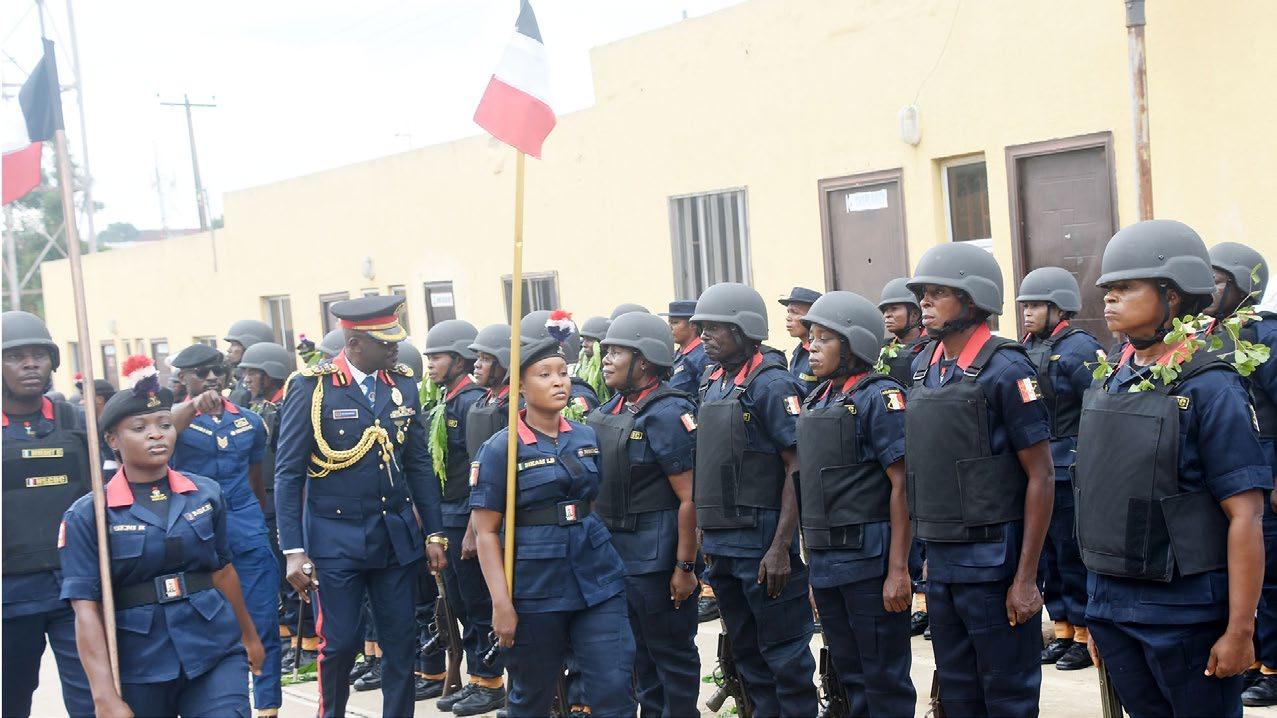
Lagos citizens are eagerly awaiting the results of the 20 LGAs and 37 local council development areas of the state after casting the ballot during a hitch-free election held on Saturday.
Though 13 out of the 15 participating political parties declined to sign the Peace Accord as a condition for ensuring a peaceful electoral process, the Lagos State Independent Electoral Commission, LASIEC, gave the assurance of a free, fair and credible poll.
Officials of the Commission commenced distribution of electoral materials timely under strict security provided by a combined team of the Nigeria Police, Nigeria
Security and Civil Defence Corps, and the joint Military patrol – OP MESSA.
Polling Unit 007, St. Stephens Nursery and Primary School, Adeniji Adele, Lagos Island, where Governor Babajide Sanwo-Olu cast his vote at 11.12am witnessed early voting as early as 8:am.
LASIEC, Chairman, Justice Bola Okikiolu-Ighile, (Retd) at the weekend, said that the commission was fully prepared for the election and that every necessary measure had been taken to guarantee the integrity of the process.
She said, “57 Chairmanship positions are being contested
for as well as 57 Vice Chairmanship positions and 376 Councillorship positions to be contested for while the Elections will be held in all the 13,325 polling Units across the State. The total number of registered voters stands at 7,060,195, Number of PVC collected is 6, 214, 970, Number of PVC uncollected is 845,225.
While disclosing that the total number of registered political parties is 19 with 15 participating, the chairman also promised the electorate and residents adequate security beyond the exercise, adding that, the commission is leaving no stone unturned to ensure a successful, free, fair and credible election that is devoid of violence, intimidation, or harassment.”
The Office of the Accountant General of the Federation (OAGF) has blamed a technical glitch for the delay in the payment of June 2025 salaries to civil servants across some Ministries, Departments, and Agencies (MDAs).
In a statement issued on Friday by the Director of Information, Bawa Mokwa, the OAGF acknowledged growing concerns over the non-payment of salaries, particularly for employees whose accounts are domiciled with Zenith Bank Plc.
“Upon investigation, it was discovered that the salary payments for employees across various MDAs were affected
due to a technical network glitch during the processing of salaries at the bank,” the statement read.
The OAGF expressed regret over the delay, noting the importance of timely salary payments to the welfare and responsibilities of public servants.
“We deeply regret the inconvenience this unfortunate incident has caused and wish to assure all affected employees that immediate steps have been taken to resolve the issue,” Mokwa stated.
He further disclosed that the OAGF is working closely with service providers and relevant stakeholders to reprocess the
failed transactions without further delay.
“We appeal to all affected staff of the Federal Public Service to remain calm and rest assured that no effort will be spared in ensuring everyone receives their rightful salaries,” the statement added.
Reaffirming its commitment to workers’ welfare, the OAGF assured civil servants that transparency, accountability, and efficiency remain central to its payroll operations.
“We remain open to continuous engagement with stakeholders to ensure sustained improvements in our service delivery,” it concluded.

BY FELIX IFIJEH
The Federal Government has suggested that the recent reduction in U.S. visa validity for Nigerians may be linked to Nigeria’s refusal to accept deported Venezuelan prisoners and illegal immigrants from the United States.
Minister of Foreign Affairs, Yusuf Tuggar, made the disclosure on Thursday while speaking on Politics Today, a programme aired on Channels Television.
THEWILL earlier reported that, effective July 8, 2025, most nondiplomatic, non-immigrant visas issued to Nigerian citizens will be limited to single entry and valid for only three months.
According to a statement by the U.S. Department of State, the decision is part of a global policy update affecting multiple countries and is intended to align visa issuance with U.S. national
security and immigration protocols.
However, Tuggar revealed that the move may have geopolitical undertones, claiming that the United States, under former President Donald Trump’s administration, had pressured several African countries—including Nigeria—to receive deported Venezuelan nationals, some of whom were released from U.S. prisons.
Tuggar said: “The U.S. is mounting considerable pressure on African countries to accept Venezuelans to be deported from the U.S., some straight out of prisons.
“It will be difficult for Nigeria to accept Venezuelan prisoners.”
He emphasised that Nigeria cannot serve as a dumping ground
for foreign convicts, especially given its own domestic challenges.
“We have enough problems of our own. We cannot accept Venezuelan deportees to Nigeria, for crying out loud. We already have 230 million people,” he said.
The minister’s remarks come amid growing speculation that the U.S. visa restriction may be a form of diplomatic retaliation for Nigeria’s participation in the 2025 BRICS summit—an international economic bloc increasingly seen as a counterweight to Western alliances.
While dismissing the BRICS-related narrative as too simplistic, Tuggar suggested that Nigeria’s unwillingness to comply with U.S. demands regarding the deportation of Venezuelans may be a more plausible explanation for Washington’s decision.
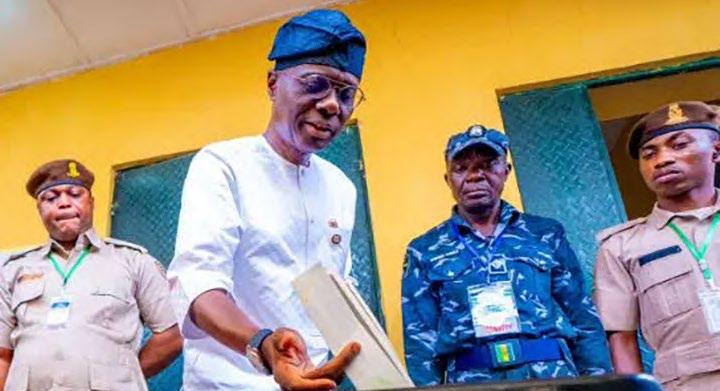
BY FELIX IFIJEH

he Nigerian Senate has recommended a N200 million compensation package for the family of a two-year-old child, Onosereba Omhonria, who was killed by a stray bullet during a National Drug Law Enforcement Agency (NDLEA) raid in Delta State. The resolution followed the adoption of a report presented by the Senate Committee on Ethics, Code of Conduct, and Public Petitions during plenary on Thursday.
The tragic incident occurred on July 13, 2023, when NDLEA operatives stormed a notorious drug hotspot known as “Abacha Junction” in the Okpanam area of Asaba, Oshimili North Local Government Area.
In the process, a stray bullet hit Onosereba, killing him on the spot, and severely injuring his younger brother, Eromonsele, in the eye.
Presenting the report, committee chairman, Senator
Neda Imasuen, revealed that while the NDLEA had shown support to the family — including an initial offer of N25 million compensation — the gravity of the trauma suffered required greater intervention. He said Eromonsele remains in critical condition, with an uncertain prognosis regarding his vision.
“Given the seriousness of the trauma suffered by the Omhonria family, the Senate urges President Bola Tinubu to assist the NDLEA with N200 million as compensation on compassionate grounds,” the report stated.
The Senate also mandated the NDLEA to continue footing the medical bills of Eromonsele and ensure he is flown abroad for specialist care. A minute silence was observed in memory of the deceased toddler. The Red Chamber, however, rejected a recommendation that the Attorney General of the Federation prosecute the NDLEA officer responsible for the shooting
after it was confirmed that the officer is currently undergoing trial.
In his contribution, Senator Adams Oshiomhole condemned the killing, stating that “no amount of money can compensate for the death of a child.”
He called for accountability, adding, “Other than the President, Vice President, Governors, and their Deputies, no other citizen enjoys immunity. A uniform is not a licence to kill and return home to sleep with your own children.”
Senate President Godswill Akpabio described the incident as “pathetic,” urging colleagues to extend private support to the affected family.
He also mandated the Committee on Legislative Compliance to follow up on the Senate’s resolutions and report back within six weeks.
J ustice Peter Lifu of the Federal High Court, sitting in Maitama, Abuja, on Friday, adjourned till July 23, 2025 for ruling on the no case submission of the former Benue State governor, Gabriel Suswam.
Suswam, the first defendant alongside, his Commissioner of Finance, Omodachi Okolobia are facing an 11-count amended charge for allegedly diverting N3.1 billion, been part of proceeds from the sales of the state government’s shares held
on its behalf by the Benue Investment and Property Company Limited through Elixir Securities Limited and Elixir Investment Partners Limited.
At the proceedings, counsel to the first and second defendant, Chenelu Ogbozor and Paul Erokoro, SAN informed the court of their application for a no case submission, pursuant to Section 302 and 303 of the Administration of Criminal Justice Act, ACJA, 2015, filed on May 28, 2025 with a written address filed and served on July 10, 2025 and urged
the court to adopt the submission and discharge and acquit both defendants, while the prosecution counsel, Rotimi Jacobs, SAN, drew the attention of the court to his response to the application, dated July, 2025, with attached written address and prayed the court to discontenance the application of the defence team, stating that it has no substance and lacked merit.
Justice Lifu adjourned till July 23, 2025 for ruling on the no case submission.
Adamawa State Governor, Ahmadu Fintiri, has imposed a 24-hour curfew on Lamurde Local Government Area with immediate effect.
The Chief Press Secretary to the Governor, Humwashi Wonosikou, disclosed this in a statement issued in Yola, the state capital, on Saturday.
He said the directive followed recent violent attacks and breaches of peace in some communities within the area.
“The government views these disturbances as unacceptable
and has directed security agencies to enforce the curfew strictly.
“The curfew is effective immediately and will remain in place until further notice,” he said.
He warned that anyone or group of people found contravening the directive would be arrested and dealt with according to the law.
“Residents are urged to abide by the curfew and provide useful information to security agencies to ensure peaceful
coexistence.
“Government will not condone acts of violence and will take necessary measures to restore peace and order,” he said.
He appealed to residents of Lamurde Local Government Area to shun rumour mongering and cooperate with security agencies to restore normalcy in the area.
According to him, the government is committed to protecting lives and property as well as ensuring the safety of all citizens.

BY FELXI IFIJEH
As the politics of 2027 gets going, players, followers and sympathisers alike are seizing every change to throw jabs and reclaim some space under the sun. That was the case last Tuesday when Mallam Garba Shehu, former President Muhammadu Buhari’s spokesperson, publicly presented a book on his boss, titled, ‘According to the President: Lessons from a Presidential Spokesperson’s Experience.’
Held at the Shehu Musa Yar’Adua Centre, Abuja, the event, which was chaired by former military Head of State, Gen. Yakubu Gowon (retd) was attended by some frontline coalition opposition leaders, such as former Vice President Atiku Abubakar; Nasir El-Rufai, former governor of Kaduna State; Buhari’s Ministers like Hadi Sirika, (Aviation); Kayode Fayemi (Solid Minerals), Prof. Ibrahim Gambari, ex-Chief of Staff; ex-Secretary to Government of the Federation, Boss Mustapha; Mustapha’s immediate successor, George Akume; and Bayo Onanuga, special adviser to President Bola Tinubu on information and strategy.
Minister of Information and National Orientation, Mohammed Idris and Nduka Obaigbena, publisher of ThisDay Newspapers and chairman of Arise TV make up the list of dignitaries. Aware that he was about to begin a controversy that would reverberate in the polity and get a rebuttal, Mustapha began his statement at the event with a disclaimer, saying, “I do not intend to stir controversy.” But that was exactly what he got, the next day after dismissing the contributions of President Bola Tinubu to Buhari’s emergence as president in 2015.
According to the former SGF, President Tinubu’s claim that he was solely responsible for Buhari’s emergence as President in 2015 was unfounded. Tinubu, in a 2022 address in Abeokuta, Ogun State, had claimed that he played a pivotal role in Buhari’s victory after three failed attempts, including nominating Prof. Yemi Osinbajo as Buhari’s running mate and helping Ogun State Governor Dapo Abiodun win his election.
Tinubu had said: “If not for me that stood behind Buhari, he wouldn’t have become President. He tried the first time, he failed. Second time, he failed. The third, he failed. “He even wept on national television and vowed never to contest again. But I went to Kaduna and told him, ‘You will run again. I will stand by you and you will win. And he agreed.”
But Mustapha dismissed the claim as historically inaccurate, noting that Buhari’s consistent political base in the North had already guaranteed him 12 million votes in every election cycle, a foundation which no single individual could claim credit for.
Mustapha argued, “In 2011, we needed a coalition, but that didn’t work. It wasn’t until 2013 that the merger between the CPC, ACN, ANPP and a faction of APGA formed the APC. That coalition produced three million additional votes. But the truth remains that Buhari had 12 million votes intact, always. When we were conceptualising the merger that birthed the APC, we knew Buhari’s cult-like following was key. In 2011, he polled 12.2 million votes. By 2015, the total votes that gave us the presidency were 15.4 million. So, the contribution from other blocs aside Buhari’s base was about three million votes.”
He stressed that Buhari’s credibility and persistence were the real game changers, adding that Buhari’s credibility, cult-like following in the North, and persistence played a more significant role in his eventual victory than any single political alliance or endorsement.
On Wednesday, expectedly, the Presidency countered claims by Mustapha, asserting that President Bola Tinubu played a decisive role in Muhammadu Buhari’s emergence as the All Progressives Congress (APC)

presidential candidate in 2015. Presidential aide, Tope Ajayi, who is the Senior Special Assistant to the President on Media and Publicity, stated on Wednesday that Buhari could not have clinched the APC ticket — let alone win the presidency — without Tinubu’s political machinery and mobilisation of key delegates.
However, Ajayi in a post on X (formerly Twitter), described Mustapha’s narrative as revisionist and misleading. “Let’s even leave the general election that brought Buhari to power in 2015. There is no way he would have won the APC presidential primary without President Tinubu,” Ajayi wrote.
He said Buhari’s victory at the APC primary in 2014, held at the Teslim Balogun Stadium in Lagos, was largely due to Tinubu’s influence in rallying governors and delegates, especially from the South-West.
“Buhari had his 12 million captive Northern votes, yet he lost three presidential elections — in 2003, 2007 and 2011. It was Tinubu’s mobilisation of APC governors and delegates that gave him the edge at the convention,” Ajayi insisted.
He added that while Buhari’s mass appeal was undeniable, credit must be given to the strategic alliances and political investments made by Tinubu at a critical point in Nigeria’s democratic transition.
Ajayi concluded that Mustapha’s remarks did “a disservice to recent political history” and downplayed the collective efforts that delivered victory to the APC in 2015. Garba Shehu, spokesperson to former President Muhammadu Buhari, says there is no rift between his principal and President Bola Tinubu.
A Buhari ally, Faroul Aliyu and former Chairman of the Board of the Niger Delta Development Commission, NDDC, later joined the fray. In his reaction, Aliyu, disagreed with Mustapha’s view. “My senior brother, Boss Mustapha, certainly got it wrong, because I can’t even remember where he was at that time,” Aliyu said.
Aliyu who served as the returning officer for Buhari during the APC primary in Lagos and highlighted Tinubu’s
behind-the-scenes support during that process credited Tinubu with helping Buhari secure the APC ticket and win the election.
He said,“Tinubu assisted, contributed, and helped Muhammadu Buhari to get the ticket and by extension win the election.” He also rejected claims that Buhari did not repay Tinubu’s support in the lead-up to the 2023 election, arguing that Buhari could have sabotaged the APC’s victory if he wanted to.
Lauretta Onochie, a former Chairman of the Niger-Delta Development Commission, responded on X platform at the weekend, stating that Mustapha’s revelation marked the expiration of what she termed a political falsehood. “Every lie has an expiry date. Yesterday, the lie that BAT (Bola Ahmed Tinubu) made Buhari president expired. Thank you, Boss Mustapha, for puncturing the lies of those unsuccessfully trying to rewrite history,” she wrote.
Onochie went further to claim that President Tinubu never supported Buhari’s candidacy in 2014, adding fuel to the ongoing debate about internal party dynamics and historical revisionism within the governing APC. In what looked like an intervention a few days later, Shehu said claims of a soured relationship between President Tinubu and ex-President Buhari are speculative and not backed by any formal disagreement.
He said, “When people are entitled to their own opinion and your own interpretation of it is purely your own entitlement. I don’t think in a formal and official sense anybody would talk about distrust or mistrust or a façade between the Buhari administration and the Tinubu administration.” Shehu said Buhari remains committed to the All Progressives Congress (APC), which brought him to power after three unsuccessful attempts.
“Muhammadu Buhari is essentially an APC member,” he said, adding that the former President has not forgotten the fact that he ran one, two, three times and failed to get the presidency until they cobbled together the APC. APC came together and gave him two terms, for which he has remained grateful and says—and that’s what I’ve learnt from him—‘I will never be ungrateful. I will never betray the party that gave me two terms in office.”
Speaking on the way forward for the party and both leaders, Shehu further said, “We see statements; we read them when people say these things. Do we get disturbed? I don’t think that is the word,” he said, “It took a lot of doing, energy and sacrifice for the APC to have been put in place, for the desperate opposition elements to come together,” he said, adding, “They tried one, two, three times, and they failed. But by this time, they came together in 2014, formed a party, and ran in 2014. They won.
“Which means, in effect, that the people who were around, who saw how much sweat it took to build this coalition—I think they are not likely to be the ones who are trying to fracture it.”
When we were conceptualising the merger that birthed the APC, we knew Buhari’s cult-like following was key. In 2011, he polled 12.2 million votes. By 2015, the total votes that gave us the presidency were 15.4 million. So, the contribution from other blocs aside Buhari’s base was about three million votes








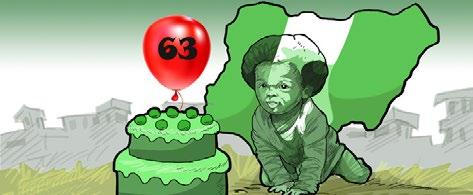




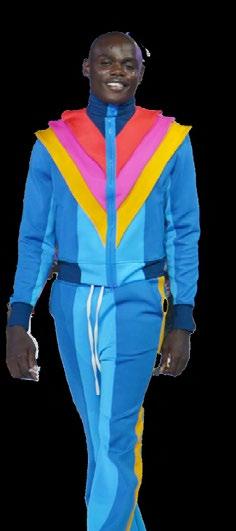
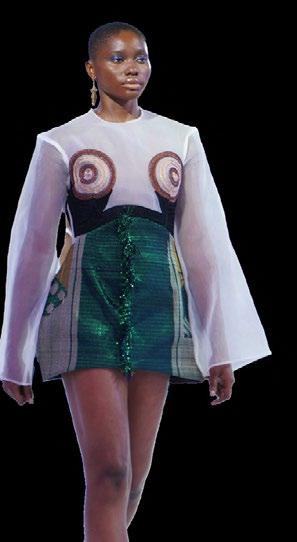








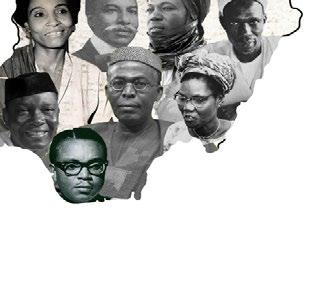






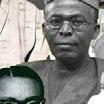








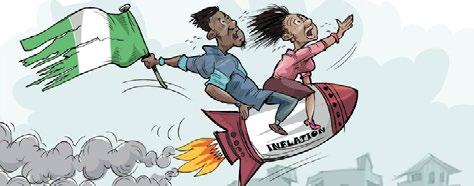


Center Spread Half Page N1, 300, 000
Double Spread N1, 550, 000

Double Spread Half Page N1, 200, 000
10X6 N700, 000
10X5 N650, 000
10X4 N600, 000
10X3 N500, 000
9X6 N440, 000
9X5 N395, 000
9X4 N335, 000
9X3 N310, 000

8X6 N410, 000

8X5 N380, 000
7X5 N320, 000
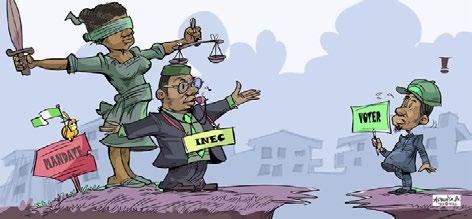



7X4 N315, 000
6X5 N280, 000

6X3 N145, 000
6X2 N85, 000
5X2 N70, 000
4X4 N160, 000
4X3 N95, 000
4X2 N65, 000
3X3 N60, 000
3X2 N50, 000
2X2 N30, 000
2X1 N15, 000
1X1 N7, 000
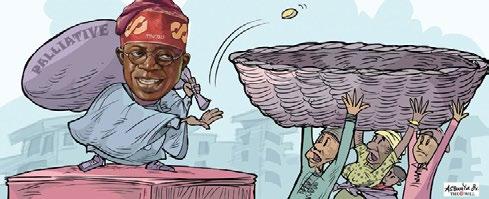


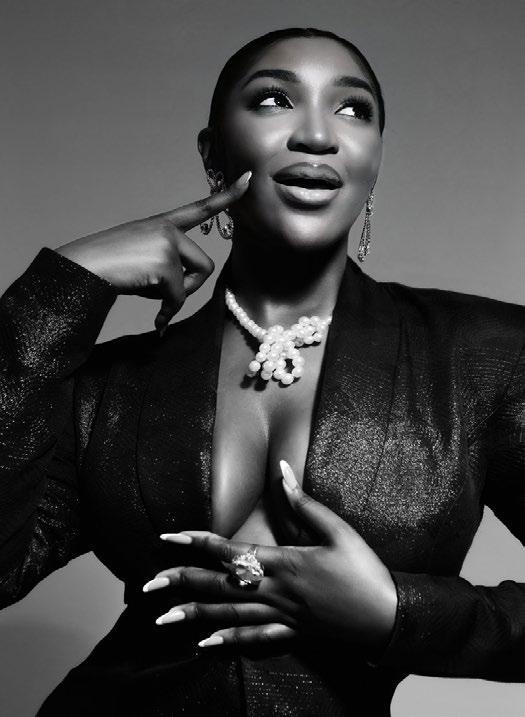





















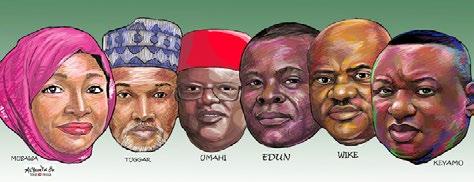

The Minister of the Federal Capital Territory, Nyesom Wike, last week accused the wife of former Minister of Transportation, Rotimi Amaechi of receiving N4 billion monthly from the Niger Delta Development Commission, NDDC, to train Niger Delta women. He made the allegation during an appearance on Channels TV, Politics Today, hosted by Seun Okinbaloye.
accountability, systemic abuse and due process.

First of all, Amaechi’s wife was not an industrialist. She has never been and that is why I call on Mr President to release the forensic audit of NDDC. I am not just saying what I am saying; let them release the document. If what I am saying is not in the document, I will resign as the Minister of the FCT. I said I will resign
In the course of the interview, the FCT Minister said, “Amaechi’s wife’s company, every month, got N4 billion to train Niger Delta women. That is N48 billion in one year alone and the forensic audit report is there. Who killed it? It was (Abubakar) Malami, then the Attorney-General. That is one of the people who is now talking. Mr President should help Nigerians. You see, this is what I have always said. Mr President should help Nigerians. Please, release the forensic audit of the NDDC.
“I have said, let Mr President please do us a favour to release that document. Former Attorney-General, Malami, killed that document to protect those who were concerned. “First of all, Amaechi’s wife was not an industrialist. She has never been and that is why I call on Mr President to release the forensic audit of NDDC.
I am not just saying what I am saying; let them release the document. If what I am saying is not in the document, I will resign as the Minister of the FCT. I said I will resign.”
Now, rival political actions often come with mud-slinging. But what the Minister said is too weighty to be confined to politicking. His allegation borders on corruption,
For one, the accusation goes beyond Amaechi and his wife. It indicted the Federal Government, the NNDC and cover-ups of wrongdoing in high places. Almost two weeks since the allegation was made, only an accountability NGO, Socio-Economic Rights and Accountability Project, SERAP, and a group of women in Rivers State, Rivers State Women Association of Nigeria, RIVSWAN, have commented on such a weighty allegation. The NNDC is still mute. The Presidency has not said a word.
RIVSWAN’s acting president Ichechi Welendu described Wike’s claims as “baseless falsehoods driven by bitterness, ignorance and a worrying lack of self-restraint, a concocted story fuelled by personal vendetta and misinformation.”
She said the claims reflect either a gross misunderstanding of the NDDC’s budgetary structure or a deliberate effort to smear the name of a respected woman of substance.”
More punchy because of its direct focus on the details of the claim, SERAP stated that the Federal Government should publish details of the forensic audit report of the NNDC from 2000 to 2019 conducted under the immediate past government of President Muhammadu Buhari.
SERAP warned in a letter to President Bola Tinubu, urging him to direct the Attorney-General and Minister of Justice, Lateef Fagbemi, to release the report, failing which it would initiate legal action
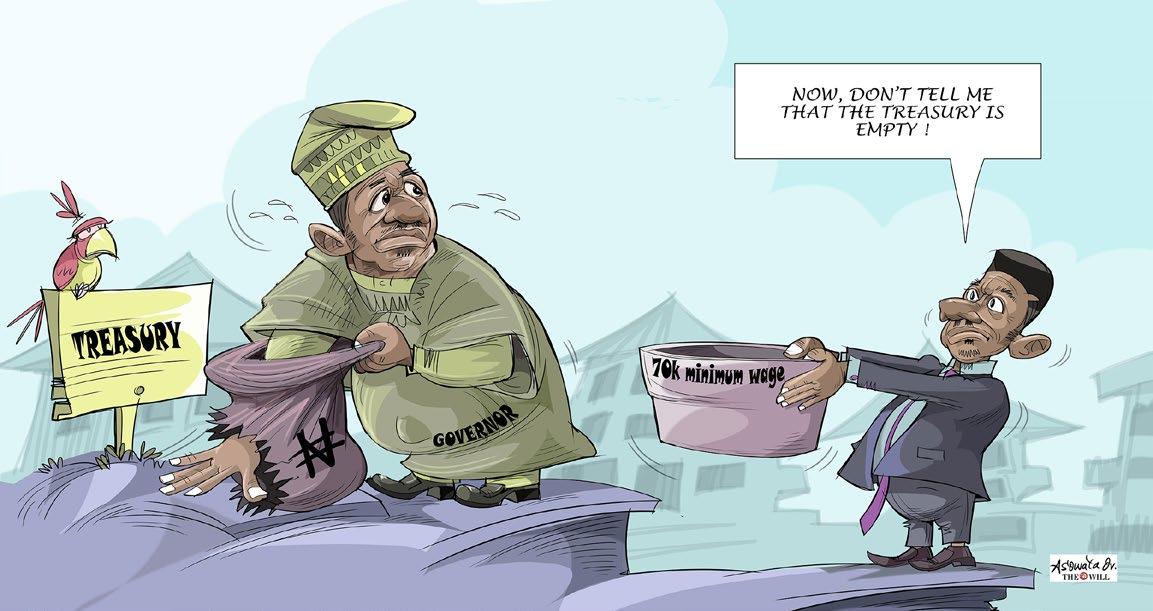
THEWILL NEWSPAPER TEAM “



BY KEN AGALA
Afew months ago, I came across a video on Facebook that deeply troubled me. In the video, a young boy attempted to snatch a phone from a passenger on a moving bus.
The passenger caught his arm, and as the bus slowed, the boy was forced to run alongside it while other passengers reached out to slap, punch, and knock his bloodied face.
The comments were flooded with praise for the passengers. Many felt justice was being served. But I added a comment, perhaps naively, that the boy was also a victim. A victim of poverty. A victim of a failed system. A victim of a political class that has stolen everything from him. If he had access to education, a job, food, or shelter, he wouldn’t be risking his life for a phone.
The responses were shocking. People insulted me. Some wished phone thieves would target me. Others accused me of being a thief myself. I replied that we are all victims— because if any of them saw Yahaya Bello, the man accused of stealing N110 billion, they would likely cheer, not condemn. That made them even angrier. I logged off, not out of fear, but out of sadness. Because this is what bad governance has done to us—it has not only stolen our resources, it has broken our sense of justice, unity, and empathy.
A few days ago, new data from the International Monetary Fund (IMF) published by Visual Capitalist, confirmed a painful truth: Nigeria is now the 12th poorest country in the world, when measured by GDP per capita.
GDP per capita reflects how national wealth is spread across the population. When it drops, it means the average citizen is poorer. It means hunger, despair, and violence are rising. It means inequality is deepening, and the streets are getting more dangerous.
Nigeria has reportedly experienced its highest GDP growth since the APC took office. But per capita income has been halved. This means a small elite is growing richer, while the majority sinks deeper into poverty. This is not growth—it’s an economic illusion driven by systemic corruption.
Let us look at the numbers:
Under Goodluck Jonathan (2014): $2,700
At the end of Buhari’s tenure (2023): $1,597
• Under Tinubu’s administration (2024): $804
That figure is lower than Nigeria’s GDP per capita before independence. Today, the average Nigerian earns less than one-

third of what they did a decade ago.
Not long ago, Adewunmi Adesina, the former President of the African Development Bank, warned that Nigeria’s poverty was not due to a lack of resources, but a lack of leadership. He was mocked by the government’s media team. But today, the numbers have proven him right.
When people are hungry, homeless, and hopeless, crime becomes survival. This economic collapse has fueled widespread kidnappings and banditry across Northern Nigeria, mass killings in Plateau, Benue, Zamfara and Kaduna States, rising cult violence and urban crime in Lagos, Port Harcourt, Aba and beyond.
And it’s not just civilians. Our police and military are poorly paid, poorly trained, and poorly armed. Terrorists now operate with drones, motorcycles, and assault rifles. Nigerian soldiers face them with obsolete rifles and unpaid allowances.
You cannot expect loyalty or patriotism from men who cannot feed their families.
Amid all this suffering, the President’s top priority is the purchase of a brand-new private jet—worth N160 billion, while our soldiers die without air support, IDPs sleep under trees and families sell children to pay hospital bills. The presidency dreams of luxury flights to exotic destinations like St. Lucia.
To understand what N160 billion means: It could equip and insure 50,000 Nigerian soldiers, build modern barracks and provide critical air support.
IT IS A MATTER OF NATIONAL SURVIVAL. WE MUST ELECT LEADERS WHO WILL CUT WASTE, PRIORITISE SECURITY, REVIVE THE ECONOMY INVEST IN PEOPLE, NOT JETS, ESTACODES AND CONVOYS
It is more than the entire annual budget of Ekiti State. Meanwhile, across Africa, Nigeria is falling behind. Nigerian girls are now trafficked not to Europe, but to African countries like Côte d’Ivoire. That is how far we’ve fallen.
How did the so-called Giant of Africa become the poverty capital of the world?
It is not a resource problem—it is a leadership problem. This is no longer a partisan debate. It is a matter of national survival. We must elect leaders who will cut waste, prioritise security, revive the economy invest in people, not jets, estacodes and convoys.
We must reject a system that rewards greed and
BY PRINCE CHARLES DICKSON
Max Jukes, the atheist, lived a godless life. He married an ungodly girl, and from the union there were 310 who died as paupers, 150 were criminals, 7 were murderers, 100 were drunkards, and more than half of the women were prostitutes. His 540 descendants cost the State one and a quarter million dollars.
But, praise the Lord, it works both ways ! There is a record of a great American man of God, Jonathan Edwards. He lived at the same time as Max Jukes, but he married a godly girl.
An investigation was made of 1,394 known descendants of Jonathan Edwards of which 13 became college presidents, 65 college professors, 3 United States senators, 30 judges, 100 lawyers, 60 physicians, 75 army and navy officers, 100 preachers and missionaries, 60 authors of prominence, one a vice president of the United States, 80 became public officials in other capacities, 295 college graduates, among whom were governors of states and ministers to foreign countries. His descendants did not cost the state a single penny.
The contrasting legacies of Max Jukes and Jonathan Edwards, one leaving a trail of societal devastation and the other a heritage of profound contribution, serve as a stark parable for Nigeria’s political reality.
Like Jukes’ godless union, Nigeria’s political landscape is dominated by coalitions built not on shared values or ideological conviction, but on the shifting sands of immediate, self-serving gain. These are not marriages of principle, but transactions of convenience—frail, temporary, and ultimately destructive. Nigeria reels under the weight of these failed political marriages, where power is grabbed, not governed for and the masses remain perpetual orphans.
It has always been a history of strange bedfellows, a very quick dive into the anatomy of political “Matrimony” in Nigeria’s political history since independence reads like a chronicle of forced and fractured unions. Parties and coalitions frequently emerge not from shared visions for development, social justice, or economic philosophy, but from the singular ambition to capture or retain power. Ethnic arithmetic and religious balancing often supersede policy alignment, creating inherently unstable partnerships.
The First and Second Republics witnessed alliances primarily designed to counter dominant regions or
personalities. The Fourth Republic, post-1999, exemplifies this trend most vividly.
The People’s Democratic Party (PDP), initially a sprawling ‘big tent’, housed factions with fundamentally opposing economic and social views held together precariously by the allure of federal power and patronage. Its main challengers, including the All Progressives Congress (APC), were themselves born not from ideological convergence, but from marriages of convenience between disgruntled PDP heavyweights and disparate opposition groups united solely by the desire to oust the incumbent. These are classic “strange bedfellows” arrangements –lacking trust, shared purpose, or commitment beyond the immediate electoral battle. Like Jukes’ union founded on ungodliness, these alliances are rooted in ambition, not nationbuilding.
Serial defectors and the infidelity of power only shows that the most glaring symptom of these failed marriages is the epidemic of political defection or ‘decamping’. Politicians change parties with bewildering frequency, demonstrating a loyalty that lies solely with personal ambition and access to resources, not with constituents or proclaimed principles.
Cross-carpeting has been normalised as a strategy, not stigmatised as betrayal. As one analysis starkly puts it, “Politicians who decamp are mostly those who face criticism or challenges within their party and view defection as a convenient escape route. They have no overriding philosophy, clear ideology or policy framework to guide their members’ actions and decisions”. The comparison to marital infidelity in the search results is apt: “In Nigeria the populace is overwhelmed by the spectacle of regular ‘decamping’ of prominent political figures followed by ‘re-camping’...
TO BUILD A LEGACY WORTHY OF ITS POTENTIAL, NIGERIA MUST MOVE BEYOND THE POLITICS OF STRANGE BEDFELLOWS AND SERIAL INFIDELITY
Nigerian politicians act in the same manner and fail to show appreciation for the fact that in exchange for their votes the people expect service from them” . High-profile figures moving between PDP, APC and smaller parties multiple times within a single electoral cycle expose the utter hollowness of party identity and the cynical nature of these political “vows.” This constant betrayal mirrors the instability of a union lacking foundational values, draining public trust and institutional integrity. Each defection underscores that the initial “marriage” was a facade for power grabbing.
There is a cancer of ideological bankruptcy at the heart of these failed marriages and serial infidelities lies a profound ideological vacuum. Nigerian political parties, with few exceptions, lack coherent, distinct, and consistently articulated ideological foundations. There




Continues from page 34
footwear manufacturing company in West Africa. This is not just a factory; it is a movement, a demonstration that Lagos can produce, compete, and export globally,” he said.
Sanwo-Olu affirmed that the factory directly aligned with the Lagos State Industrial Policy (2025–2030), which seeks to double manufacturing’s contribution to the state’s Gross Domestic Product from 7.5 per cent to at least 15 per cent by 2030, reduce dependence on imports for basic consumer goods and foster an ecosystem where local industries can thrive through forward and backward value chain
over 35,000 jobs.”
Continues from page 34
stood at 23.87 per cent in 2024 from 17.96 per cent in 2023, while liquidity ratio (LR) moved from 37.24 per cent to 47.35 percent in 2024.


“Yikodeen is not only producing shoes; it is producing livelihoods, opportunities and dignity,”
The founder and CEO of Yikodeen, Mr. Atunde Shamsideen, while recounting his entrepreneurial journey, described the venture as a stubborn dream
“This vision started in a room, with just 20 pairs of shoes. Today, we produce over 2,000 pairs daily to ISO, ASTM and Nigerian industrial standards,” he
He commended the NCDMB for its pivotal role in the company’s growth, noting how the Board helped facilitate years of product testing and eventual adoption by oil and gas companies like Saipem and Daewoo. “Their enforcement ensured our products got through. Today, those same companies are our
Shamsideen stressed the potential for job creation if local procurement policies are enforced, claiming: “Just two percent of safety boots used in Nigeria are locally manufactured. If we enforce local purchase in the oil and gas and public sectors, we can create
Yikodeen’s production ecosystem already engages women in raw material recycling and trains over 1,000 people yearly, according to the CEO. “Buying Made-in-Nigeria goes far beyond commerce; it is about creating value chains, livelihoods and national dignity,” he added.
The Director for Lagos Operations, Standards Organisation of Nigeria, Mrs Teresa Ojomo, who represented the Director-General, Dr Ifeanyi Okeke, praised Yikodeen’s adherence to national and international safety standards.
“This is not just a facility; it’s a declaration that Nigerian manufacturing can lead globally. SON will continue to support companies like Yikodeen who take quality seriously,” he said.
Okeke underscored SON’s partnership with Yikodeen since 2006, culminating in the Mandatory Conformity Assessment Programme certification, which assures consumers of quality and safety.
He also cited Yikodeen’s certification under critical standards, such as NIS ISO 20346:2004 and ISO 20345:2022, adding, “Standards are not obstacles — they are enablers. They are the bridge between ambition and market access.”
The Ogwa-Olusan of Warri, Chief Brown Mene, representing HRM, Ogiame Atuwatse III, CFR, the Olu of Warri, described Yikodeen as a beacon of hope for Nigeria.
He likened the company to a stubborn vision that refused to be beaten by headwinds, proving that “Nigeria is on an upward trend.”
He also urged the team to remain visionary and expand globally, assuring that “the name of Yikodeen will blaze bright and proud.”
The statement also quoted the Managing Director, Haruna Musa, Ph.D, as saying, “The bank was well-positioned to compete effectively on all fronts and meet customers’ needs through fair and ethical financing.”
He said: “Despite the challenging operating environment, the bank continues to enhance its performance across all indices, recording significant growth in both financial and non-financial metrics.”
Haruna added, “We remain on track to become the leading ethical bank in Africa. We will continue to focus on strengthening our relationships with our customers while attracting new ones, supporting not just individuals and businesses but also our communities through digital platforms and innovative products and services.”
“We are confident in our journey to lead the future of ethical finance in Africa
and will not relent in our commitment to excellence while delivering long-term value to all stakeholders,” he stated.
Meanwhile, the management of Jaiz Bank proposed a dividend payout of N0.07 per share for 2024 financial as against N0.04 per share proposed in 2023 financial year.
Jaiz Bank closed its trading day (Friday, July 4, 2025) at N3.15 per share on the Nigerian Exchange (NGX). Jaiz began the year with a share price of N3.00 and has since gained 5 percent on that price valuation, ranking it 98th on the NGX in terms of year-to-date performance.
Data by the NGX indicates that Jaiz Bank is the 29th most traded stock on the Nigerian Stock Exchange over the past three months (Mar 28 - Jul 4, 2025).
JAIZBANK has traded a total volume of 363 million shares—in 11,089 deals— valued at NGN 1.15 billion over the period, with an average of 5.76 million traded shares per session. A volume high of 24.9 million was achieved on April 28th, and a low of 458,886 on May 14th, for the same period.
In his special remarks, the Chief Host, Executive Governor of Borno State, Prof Babagana Umara Zulum, said these tractors being commissioned were procured by his predecessor, Sen. Kashim Shettima when he was the executive governor of Borno State. “He procured 1,000 tractors with their implements.
“His investment is the single largest not just in Borno state but also in Nigeria. The National Assets Restoration programme we are launching could not have been possible without that foundational investment”, he added, commending NASENI for restoring broken down tractors owned by Borno state government without collecting money from the state government.
The Executive Vice Chairman, NASENI, Mr. Khalil Suleiman Halilu in his keynote address said the Agency was showing that Nigerian problems can have Nigerian-engineered solutions. “We are building local capacity, developing talent pipelines, and enabling technology transfer at scale. We are turning NASENI into a true national enablerquietly but boldly proving that government can deliver, and that transformation is possible”.
When we set out to design the Asset Restoration Programme at NASENI, we were not just looking for another project to tick off. We were confronting a reality: that all across Nigeria, from farms to security outposts, public assets worth trillions of naira had been written off, locked away, or left to rust—not because they were beyond repair, but
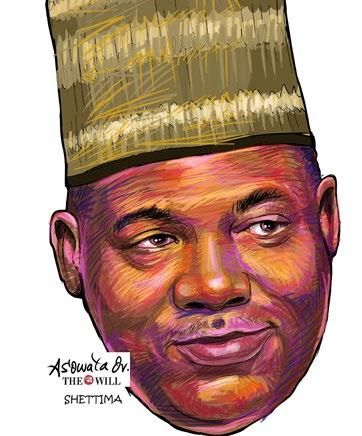
because there was no clear system to bring them back to life.
He said our national survey revealed that Nigeria holds over 47,000 broken-down but serviceable agricultural and law enforcement assets. The cost to replace them would exceed ₦14 trillion. “But at NASENI, we asked a simple question: Why replace what we can restore?
“With the right engineering, the right people, and the right partnerships, we found that we can

recover these assets for just 15 to 25 percent of their replacement value—and still achieve full functionality. That is over ₦10 trillion in national savings, while reviving productivity, jobs, and security on the ground,” he added.
He thanked President Bola Ahmed Tinubu, and Vice President, Kashim Shettima for their endless support, belief in our mission, and their constant encouragement that we must not only think big— but act fast. He thanked Governor Zulum for his support and leadership which have helped bring this vision to life here on Borno soil—turning his state into the first node in this national restoration network.
In his address, Minister of Agriculture and Food Security, Sen. Abubakar Krai, who reeled out the statistics of broken-down tractors nationwide said the National Assets Restoration Programme is a welcome development and it will be instrumental to meeting the foods security goal of the Renewed Hope Agenda of government. He commended the EVC of NASENI for the bold vision in rebuilding and repositioning NASENI.
Earlier, Engr. Mohammed Yadudu, Programme Coordinator, Asset Restore, NASENI, said with support from NASENI’s technical partner, the Machine and Equipment Corporation Africa (MECA) in December 2024, began to restore back idle government assets that have long fallen into disuse but held immense value for agricultural economy.

BY KINGSLEY NDUBUEZE AYOZIE
Afew months ago, the Federal Government unveiled a corporate governance scorecard aimed at evaluating and improving the performance of StateOwned Enterprises (SOEs).
The announcement, delivered by the Minister of Finance and Coordinating Minister of the Economy, Mr Wale Edun, marked a potentially transformative shift in the management of government-owned entities. Spearheaded by the Ministry of Finance Incorporated (MOFI) in collaboration with the World Bank, the initiative seeks to embed accountability, transparency and financial discipline in public-sector enterprises. However, beyond the public sector, this development raises broader questions about corporate governance culture across the private and public sectors in Nigeria. This piece offers an insight into the strategic role of professional accountants, specifically internal auditors, external auditors and audit committees, in promoting effective corporate governance. As guardians of financial integrity and organisational accountability, their roles have never been more crucial.
UNDERSTANDING THE ROOTS OF CORPORATE GOVERNANCE FAILURES
The early 2000s ushered in a wave of corporate failures that rocked global markets. High-profile collapses like Enron in the United States, where senior executives colluded with the then-revered accounting firm Arthur Andersen to conceal billions in debt, demonstrated the consequences of unchecked corporate malfeasance. Other global cases include MCI, BCCI, Tyco, Ahold, Freddie Mac, Cadbury Schweppes and WorldCom. These events were not isolated. They revealed systemic weaknesses in governance structures, often due to lax oversight, conflicts of interest, and poor financial reporting.
Nigeria was not exempt. Governance breaches were widespread, with companies flouting accounting standards and corporate rules, leading to instability and eroded investor confidence. To fully appreciate the necessary reforms, it is important to define the key concepts.
CORPORATE FAILURE AND GOVERNANCE: DEFINITIONS AND PRINCIPLES
Corporate failure refers to a situation where a business is no longer viable, financially or operationally, resulting in its collapse or cessation. This often stems from mismanagement, fraud, or poor decision-making. One of the most effective remedies is the adoption of sound corporate governance practices.
Corporate governance is the framework by which companies are directed and controlled. It serves the interest of all stakeholders: shareholders, regulators, lenders, employees, and the public. It is built on principles such as transparency, accountability, integrity, independence, and compliance. Where these principles are faithfully observed, organisations experience improved performance, reputational capital, and resilience.
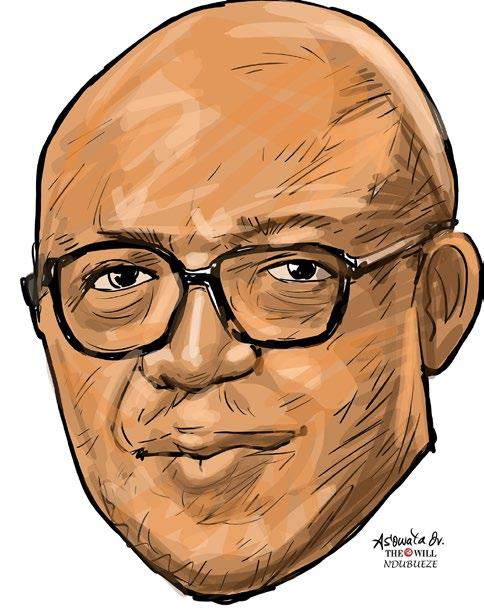
THE ACCOUNTANT’S ROLE IN STRENGTHENING GOVERNANCE
Internal auditors:
These professionals are the first line of defence. They help implement new standards, prevent and detect fraud, uncover irregularities, and support management in improving internal control systems. Internal auditors also serve as a liaison with external auditors during year-end reviews, ensuring readiness and reducing audit costs. Their proactive role in continuous monitoring ensures that governance lapses are addressed before they become crises.
External auditors:
External auditors provide an independent review of an organisation’s financial health and governance mechanisms. They assess the appointment and effectiveness of executive and non-executive directors, evaluate the establishment and functioning of audit committees, and review internal control systems. They are also responsible for verifying that directors report annually on the effectiveness of internal controls and that such reports are published in annual filings. Importantly, they ensure directors have access to independent professional advice when needed, reinforcing the credibility of board decisions.
Audit committees:
These committees serve as a vital check on both internal and external audit functions. They participate in appointing external auditors, determining their remuneration, and monitoring their performance.

When a corporate entity adopts a well-structured governance framework, the benefits are multifaceted. It promotes ethical leadership, improves organisational image, and strengthens stakeholder confidence
In organisations without an internal audit function, audit committees are expected to justify this absence in annual reports and make recommendations to the board regarding the potential need for such a function. Their role in overseeing the financial reporting process is critical to ensuring accurate disclosures and sound governance practices.
THE STRATEGIC VALUE OF CORPORATE GOVERNANCE
When a corporate entity adopts a well-structured governance framework, the benefits are multifaceted. It promotes ethical leadership, improves organisational image, and strengthens stakeholder confidence. A robust governance structure supports strategic decision-making, facilitates compliance with regulations, and enhances operational efficiency. It also helps attract investment by building trust with shareholders and the wider public.
Moreover, good corporate governance mitigates conflicts of interest, improves internal controls, retains competent leadership, and strengthens risk management processes. These outcomes are essential for long-term sustainability, especially in volatile or emerging markets like Nigeria.
Corporate governance is not merely a regulatory obligation; it is a strategic imperative. Accountants, by virtue of their training and professional ethics, are uniquely positioned to lead this charge. Whether as internal or external auditors or as members of audit committees, their role in upholding integrity, transparency, and accountability cannot be overstated.
As Nigeria seeks to reform its public institutions and corporate culture, leveraging the expertise of accountants is essential. The newly introduced Corporate Governance Scorecard is a step in the right direction, but its success hinges on a broader cultural shift, one that places professional standards, ethical conduct, and stakeholder value at the heart of all corporate operations.
•Ayozie is a Chartered Accountant and Public Affairs Analysts.


The question is: are Africans genetically inferior? This is a question that has been raised repeatedly over the years and throughout history. To respond, you must understand both the science of genetics and the history of these claims. First, it’s critical to understand that the concept of genetic inferiority stems from eugenics, a contentious field that emerged in the late 1800s and early 1900s according to records.
Eugenics was founded on the premise that some genetic traits may be handed along to improve individuals while others, dubbed “undesirable,” should be avoided or eliminated. Eugenics, in my perspective, might simply be defined as human genetic mutilation or selective breeding to increase genetic quality in order to achieve a desired outcome through reproduction.
However, attempts to “improve” humans through selective breeding are unethical and unscientific. As a result, scientists, ethicists, and governments worldwide today strongly oppose eugenics.
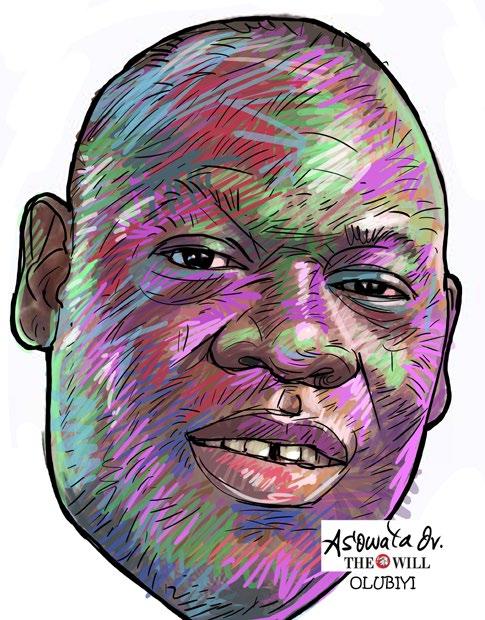
People are battling for improved education, healthcare, and infrastructure, demonstrating that the concept of hereditary inferiority is nothing more than a dangerous fiction
physical ability, or merit. Everyone, regardless of background, has the ability to accomplish greatness. Instead of adhering to obsolete and discredited notions of genetic inferiority, the world should prioritise encouraging equality, giving access to resources, and recognising the diversity of our global society. Colonialisation, exploitation, and division have all played a role in shaping Africa’s history.

During this period, racial superiority theories were widely advocated, particularly in Western countries, with some claiming that individuals of African descent were innately inferior to those of European descent. These views were frequently founded on misinterpretations of scientific results, rather than objective or credible data.
Scientists have long refuted the thesis of racial genetic inferiority, and contemporary genomics has demonstrated that there is no underlying genetic difference in IQ, talents, or merit between races. In fact, Africa is frequently referred to as the “Cradle of Humanity,” as it is thought to be the genesis of the human race. The genetic variety among African populations is the largest in the world, indicating that Africa has a rich genetic ancestry.
environment, upbringing, diet, education, and opportunity. More specifically, intelligence is a multidimensional attribute that cannot be correctly quantified by a single component, and it is absolutely not related to race.
In truth, race does not genetically determine variations in intelligence, behaviour, or achievement. Unfortunately, the legacy of eugenics has had a long-term influence, notably on how people of African origin are seen and treated globally. These preconceptions persist today, both in subtle and overt forms.
These external factors were frequently rationalised by ideas of racial superiority and the notion of African inferiority. However, in recent decades, Africans have made significant progress in overcoming these obstacles, indicating that, given the chance, they can thrive in any discipline. In Lagos and other African cities, there is an increasing sense of pride and drive.

Africans have made significant contributions to science, technology, art, and culture, both on the continent and beyond the world. Africans have consistently demonstrated their perseverance, ingenuity, and intellectual capacity. The concept of African inferiority has historically been used as a tool for colonisation and exploitation, with colonists justify their rule over
Africans by declaring they were “genetically inferior.” This misleading story has had long-term consequences for the perception of Africans, although it is not backed by any serious scientific data.
In fact, human genetic material is 99.9 percent similar across all populations, implying that any deviations are minor and do not justify notions of racial superiority or inferiority. As a result, race does not determine disparities in attributes such as intelligence or physical ability, but rather a complex interplay of genetics,
For example, historical biases about African intellectual and physical ability continue to influence attitudes and policies, frequently resulting in systematic inequities in education, work, and healthcare. Many Africans across the continent have made substantial contributions to world culture, science, and politics.
For example, in Lagos, the tech startup sector has grown dramatically in recent years, resulting in novel solutions to issues such as poverty, healthcare, and education. Nigerian inventors, such as the founder of the mobile banking platform Paga, are spearheading attempts to transform how Africans access financial services.
This example, and others across the continent, demonstrate that Africans are not “genetically inferior”; rather, they are resourceful, capable, and full of potential. In fact, the concept of genetic inferiority is not only scientifically inaccurate, but also morally harmful, as it diminishes the hard work and resilience of numerous people who have overcome adversity to thrive.
The important thing to remember is that race has no inherent relationship to intelligence,

People are battling for improved education, healthcare, and infrastructure, demonstrating that the concept of hereditary inferiority is nothing more than a dangerous fiction. Finally, Africans are no more genetically inferior than any other tribe. The notion that one race or group is genetically superior to another is based on ignorance and lacks a scientific foundation.
As Africa continues to expand and achieve incredible progress, it becomes evident that the continent and its people have infinite potential. As a result, it is time to abandon these harmful prejudices and instead focus on establishing a world in which everyone, regardless of background, has the opportunity to achieve. Africa is more than just a continent facing issues; it is a land of immense potential, rich history, and extraordinary resilience.
The actual value of any community is its diversity and ability to empower each individual to reach their full potential. Moving forward, we must promote equality, celebrate diversity, and collaborate to create a world in which everyone has access to opportunities. Good luck!
How may you obtain advice or further information on the article?
• Olubiyi is an Entrepreneuship and business Management expert.
Photo Editor: Peace Udugba [08033050729]
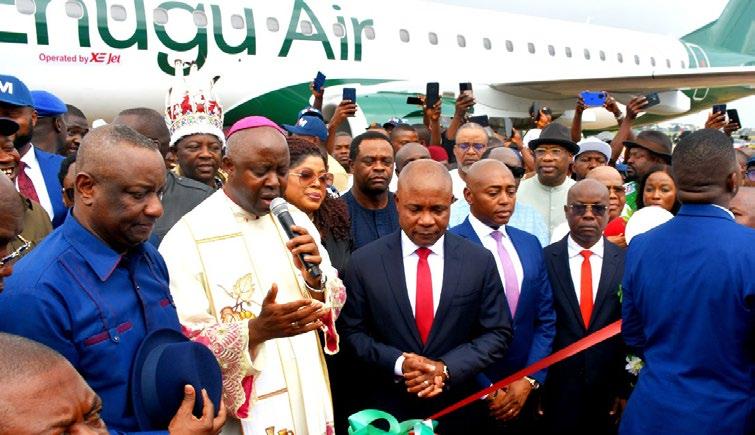
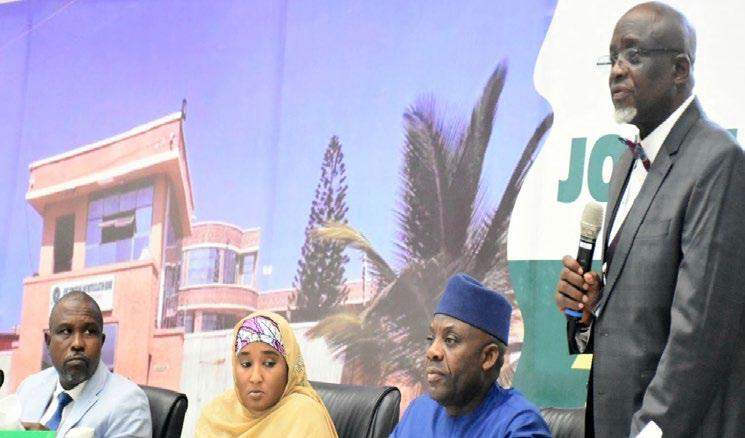
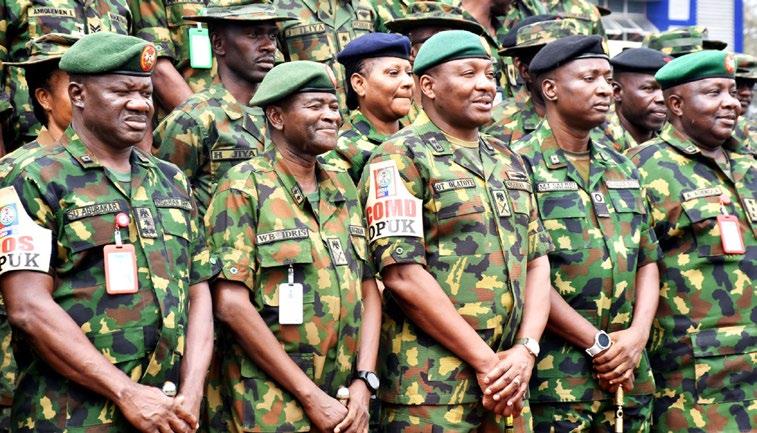
L-R: Chief of Staff, 82 Division of Nigerian Army (82 DNA), Brig.-Gen. Shuaibu Umar-Abubakar; representative of the Chief of Defence Staff, Maj.-Gen. Wara Idris; General Officer Commanding 82 DNA, Maj.-Gen. Oluyemi Olatoye; Resource Person, Commodore Momoh Jimoh and Commander of the Division, Intelligence Brigade, Brig.-Gen. Adebayo Adekola, during Defence Headquarters 2025 First Bi-Annual Stress Management Disorders and Emotional Intelligence for Personnel Serving in Theaters of Operation Retreat in Enugu on July 9, 2025.
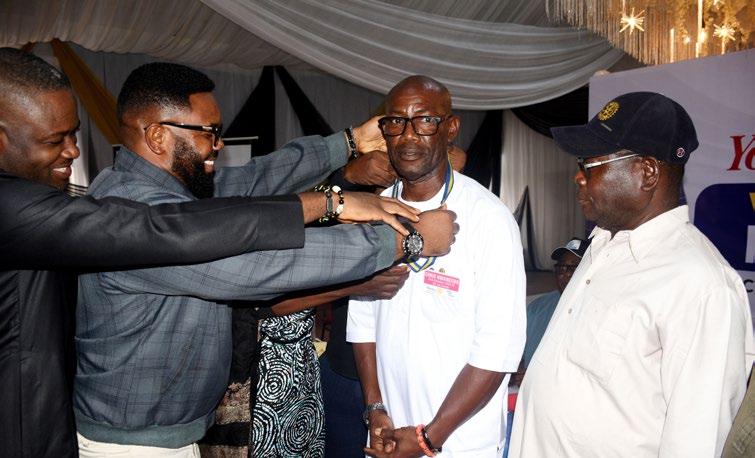

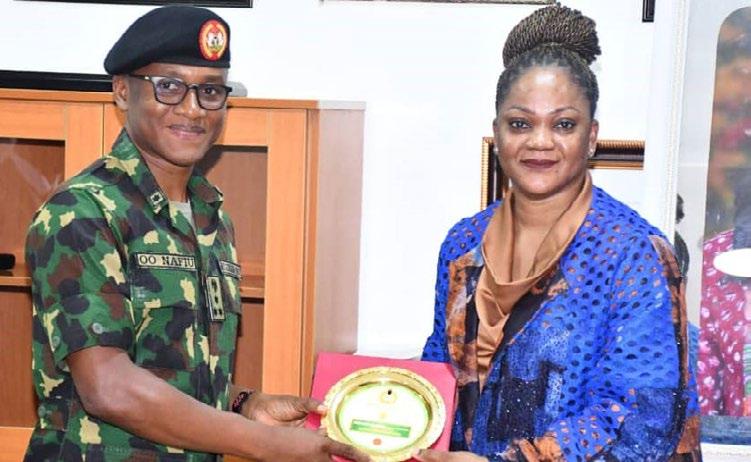





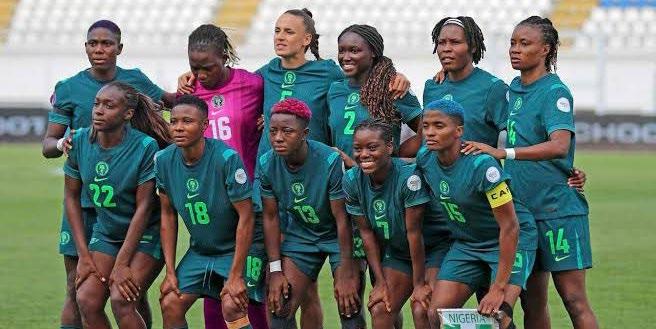
BY JUDE OBAFEMI
Four minutes into the Super Falcons’ opening match at the 2025 Women’s Africa Cup of Nations, Asisat Oshoala rose above a crowded Tunisian penalty area, meeting Rinsola Babajide’s precise free-kick with a powerful header that sparked wild celebrations at Stade Larbi Zaouli in Casablanca, Morrocco. This early goal set the tone for Nigeria’s commanding 3-0 victory over Tunisia on July 6, marking a confident start to their pursuit of a record-extending 10th continental title, a campaign the Nigeria Football Federation has branded “Mission X.” Under the guidance of coach Justin Madugu, the Super Falcons followed this triumph with a hardfought 1-0 win over Botswana last Thursday, earning their place in the quarter-finals. These results signal Nigeria’s intent to reclaim their dominance in African women’s football, but they also highlight challenges in a competitive landscape where rivals are closing the gap.
The Super Falcons have long been the standard-bearer of African women’s football. With nine titles from 12 editions of the Women’s Africa Cup of Nations since 1998, they have won 48 of 61 matches, a record unmatched by any other nation. Their most recent triumph came in 2018, when they defeated South Africa 4-3 on penalties after a goalless draw. However, the 2022 tournament in Morocco exposed vulnerabilities, as
However, the Botswana match exposed ongoing issues with finishing and structure
action

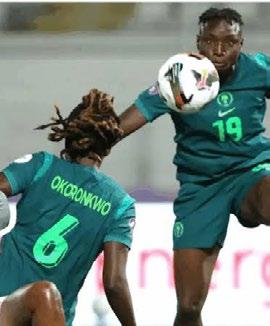

Nigeria lost to South Africa, Morocco and Zambia, finishing fourth, their worst performance in the competition’s history. This setback, coupled with a group-stage exit at the 2024 Paris Olympics, has fueled the team’s determination to restore their legacy. The Nigeria Football Federation’s “Mission X” campaign reflects this ambition, aiming to galvanise players and fans alike for a 10th title, referred to as “La Decima.” The return of fitness coach Per Karlsson, whose expertise was evident in the team’s high-energy performance against Tunisia, has bolstered their preparations, while Justin Madugu’s appointment as head coach signals a new chapter after Randy Waldrum’s departure last year.
The 3-0 victory over Tunisia exhibited Nigeria’s attacking potential and defensive solidity. Oshoala, a six-time African Women’s Footballer of the Year, opened the scoring in the fourth minute, capitalising on Babajide’s well-delivered freekick. Babajide, making her tournament debut after switching allegiance from England in 2023, doubled the lead just before half-time with a clinical finish past Tunisia’s goalkeeper, Soulaima Jobrani. Her goal, followed by a celebration paying tribute to a former Super Eagles star, highlighted her emotional connection to the team. Substitute Chinwendu Ihezuo sealed the win in the 84th minute, converting a cross from Ashleigh Plumptre. Nigeria dominated possession and exploited Tunisia’s defensive gaps with pace and width, though they survived a scare when a penalty decision against Osinachi Ohale was overturned by VAR in the 76th minute. Madugu, while pleased with the result, noted the team’s wastefulness in front of goal, a sentiment echoed by former captain Desire Oparanozie, who described the performance as dominant but lacking clinical finishing.
The subsequent match against Botswana on Thursday tested Nigeria’s resolve. Expected to overpower the lowest-ranked team in the tournament, the Super Falcons struggled to break down a stubborn Botswana defence, managing only a 1-0 victory through Ihezuo’s 89th-minute goal. The Mexico-based striker, introduced as a substitute, latched onto a loose ball in the box to secure Nigeria’s place in the quarter-finals, becoming the first team to advance. Despite the

win, the performance questions Madugu’s tactical decisions and the team’s inability to convert chances. Madugu himself acknowledged the challenge, stating that Botswana’s spirited play and Nigeria’s occasional lapses in focus made the match tougher than anticipated. He also confirmed plans to rotate the squad for the final group match against Algeria, especially with midfielder Deborah Abiodun suspended after receiving a second yellow card.
Tactically, Madugu has employed a 4-3-3 formation, emphasising high pressing and wing play. Against Tunisia, Babajide and Toni Payne stretched the opposition’s defence, creating space for Oshoala’s runs. The midfield, anchored by Abiodun and Halimatu Ayinde, provided energy but lacked cohesion at times, with Abiodun’s advanced role against Tunisia nearly proving costly due to her clumsy challenge on Raina Aouina. Madugu’s second-half adjustments, including a triple substitution of Abiodun, Oshoala, and Babajide for Christy Ucheibe, Esther Okoronkwo, and Ihezuo, revitalised the attack. Okoronkwo, named CAF’s Woman of the Match, nearly scored and assisted Ihezuo’s goal, demonstrating the squad’s depth. However, the Botswana match exposed ongoing issues with finishing and structure. Oshoala and Babajide struggled to make an impact, and the team’s toothless possession underscored the need for sharper attacking play. Karlsson’s fitness work has been a clear asset, enabling Nigeria to maintain intensity late in games, as evidenced by Ihezuo’s decisive strike against Botswana. This physical edge could prove critical in knockout stages, where endurance often decides tight contests.
The Super Falcons’ squad blends experience with youth. Oshoala, despite a goalless run in 11 NWSL matches for Bay FC in 2025, remains a focal point, with Madugu praising her as a “jewel” for her 31 international goals. Captain Rasheedat Ajibade, the 2022 WAFCON joint-top scorer, drives the team from midfield, though she admitted limited bonding time has affected cohesion. Chiamaka Nnadozie, named CAF Goalkeeper of the Year in 2023 and 2024, anchors the defence with her reflexes and positioning, conceding only six goals in 14 matches since the 2023 World Cup. Plumptre’s versatility, allowing her to play centre-back, left-back or holding midfield, adds tactical flexibility, while veterans like Osinachi Ohale
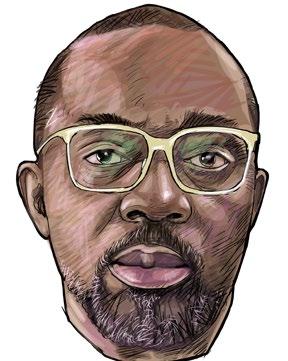
TheUnited States Department of State announced on July 8 that non-immigrant visas issued to Nigerian citizens would be limited to a single entry with a maximum validity of three months. This applies to tourist, business, student and exchange visitor visa categories.
The decision ends the previous practice of issuing multiple-entry visas valid for up to five years to Nigerian applicants. The embassy clarified that this change reflects its periodic visa reciprocity review and alignment with global standards, emphasising that such validity changes can be increased or decreased over time.
Nigerian official channels have responded quickly. The Ministry of Foreign Affairs spokesperson, Kimiebi Ebienfa, issued a statement voicing concern that the decision placed “a disproportionate burden on Nigerian travellers, students seeking academic opportunities, professionals engaging in legitimate business, families visiting loved ones and individuals contributing to cultural and educational exchanges”. The Ministry emphasised Nigeria’s desire for resolution through diplomatic channels and its willingness to evaluate the matter in collaboration with relevant agencies.
Nigerian officials challenged the claim of policy symmetry. Presidential adviser Bayo Onanuga described suggestions that Nigeria had reduced visa validity for U.S. citizens as “misinformation and fake news”. The government also denied having introduced new restrictions for Americans, reinforcing that changes in visa policy are unrelated to Nigeria’s own immigration procedures.
Nigeria’s short-stay electronic visa system was introduced in May 2025 to streamline entry procedures and improve ease of travel for foreigners. Under it, visitors apply online and receive e-visas within two days. These e-visas are single-entry and valid for up to three months. The Nigerian Government has included this initiative among reforms intended to enhance bilateral relations, but the U.S. visa change applies to non-e-visa categories.
A delegation led by Interior Minister, Olubunmi Tunji-Ojo, met with U.S. Ambassador Richard Mills Jr on July 9 to discuss concerns over the new U.S. visa terms. Discussions centred on reciprocal arrangements, overstay management and information sharing, and the ambassador explained that the U.S. decision aligned with existing international benchmarks. The dialogue was described as constructive, though substantive changes have not been confirmed.
The U.S. Embassy emphasised that the change applies only to visas issued on or after July 8, and holders of older visas will maintain their current validity until expiry. Officials spoke of ongoing efforts with Nigeria to meet technical benchmarks relating to travel documents, visa overstays and criminal record exchange.
The timing of the U.S. change coincided with other visa tightening. The United Arab Emirates implemented new restrictions on Nigerian visitors and the United Kingdom also adjusted study and work visa requirements for Nigerians. These combined measures have increased travel complexity for Nigerians planning trips abroad.
Frequent Nigerian travellers to the United States may now face challenges. Students attending programmes or conferences may find that short visas force expensive repeat applications. Business people attending multiple engagements or site visits will require more frequent embassy visits. Families visiting relatives for events

or medical reasons may face unexpected delays. Each additional application will bring further cost and logistical burden.
One possible factor behind the United States decision is Nigeria’s refusal to accept deported Venezuelans and other third-country deportees. The United States government, under President Trump, has sought agreements with African countries to accept migrantsincluding former prisoners-deported from the United States. Foreign Affairs Minister, Yusuf Tuggar, speaking from a summit in Brazil, stated that Nigeria could not “accept Venezuelan prisoners into Nigeria because we have enough problems.” Analysts have interpreted this refusal as a source of tension that may have influenced the shortened visa validity.
A strategic weakness for Nigeria on this subject is the absence of ambassadors. The country has lacked appointed ambassadors in critical capitals, such as Washington D.C. The absence of high-level representation reduces capacity for negotiation and may delay resolution of emerging issues. Funding constraints have also limited embassy activities, making missions reliant on visa fees to cover operational costs.
To remedy this situation, Nigeria will need to increase support for its diplomatic corps with clear budget allocations that allow embassies to operate independently of consular revenue. Fully staffed missions with dedicated ambassadors could respond more promptly to challenges like the U.S. visa change. In the immediate

term, Nigeria could also reaffirm publicly that it continues to issue multi‑entry visas to Americans for up to five years, to help correct any perception gap.
Such a stance would signal goodwill while preserving Nigerian interests. A joint working group between the U.S. and the Nigerian Government could develop a framework for periodic dialogue on visa terms. Objectives could include improving Nigeria’s systems for verifying passports, linking immigration records and reducing visa overstays. Nigeria’s adoption of an e-visa system is a step in the right direction, but additional reforms would provide a stronger basis for revising visa reciprocity.
If Nigeria bolsters its passport and immigration systems, then topics like overstay management and data exchange could be resolved. That would create conditions for U.S. officials to extend visa validity periods gradually. This approach would demonstrate that visa policy is based on clear criteria rather than political signalling.
In economic terms, longer-term visas would facilitate business, investment and cultural exchange. U.S. survey data shows that around one‑fifth of the non‑immigrant visas issued in Africa in 2024 were granted to Nigerians, making them the continent’s second largest recipient after South Africa. Restrictive visas could deter educational enrolment, professional collaboration and tourism.
On a diplomatic level, the episode highlights how poorly staffed missions can allow technical issues to evolve into political friction. It also highlights the importance of negotiating visa agreements that are interest-based and supported by technical strengthening. Diplomatic ambition without investment creates vulnerability. Travellers should not bear the cost of underfunded embassies or delayed diplomacy.
The U.S. and Nigeria maintain a longstanding bilateral relationship that encompasses commerce, defence, development and people-to-people ties. A dependable visa regime would align with those deeper connections and benefit both citizens. It would also free diplomatic efforts from reactive posture and ground them in steady partnership.
In order to restore multi-entry visa access, Nigeria must consider several measures. First, it should allocate better funding to the Ministry of Foreign Affairs and embassies. That would reduce dependence on consular fees and allow missions to engage in policy dialogues proactively. Second, it should affirm that it continues to issue five‑year multi-entry visas to Americans under existing policy. That public declaration is a necessary step in establishing goodwill credibility. Third, initiatives to improve immigration data, such as e-visas and passport verification systems, should be accelerated. Fourth, a bilateral working group could formalise criteria and timelines for reviewing visa reciprocity, including overstay data sharing.
If both sides agree on targets, the U.S. could reverse the three-month limitation when benchmarks are met. Nigeria would then have delivered concrete improvements and regained longer visa access. That outcome would be win-win rather than tit-for-tat.
This visa adjustment offers a lesson. Policy alignment works best when backed by technical depth, diplomatic presence and mutual clarity. Nigeria’s government should treat this moment as an opportunity to build its institutions, fund its missions and deepen its bilateral conversation with the United States.